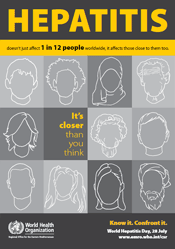 Hepatitis is closer than you thinkCairo, 26 July 2012. The second World Hepatitis Day was observed across the world on Saturday, 28 July, with new information highlighting the seriousness of this disease and its widespread distribution regionally and globally.
Hepatitis is closer than you thinkCairo, 26 July 2012. The second World Hepatitis Day was observed across the world on Saturday, 28 July, with new information highlighting the seriousness of this disease and its widespread distribution regionally and globally.
Despite its staggering toll on health, hepatitis remains a group of diseases that are largely unknown, undiagnosed and untreated. About 1 million people die every year around the world because of viral hepatitis infections. Types B and C are especially serious yet remain hidden. They lead to chronic infection in millions of people, and, together, are the most common cause of cirrhosis and cancer of the liver.
“Hepatitis: It’s closer than you think. Know it. Confront it.” This was the slogan for World Hepatitis Day 2012.
Marked on 28 July every year, the Day provides an opportunity to raise awareness of the different forms of hepatitis: what they are and how they are transmitted; who is at risk; and the various methods of prevention and treatment.
All types of viral hepatitis occur throughout the Eastern Mediterranean Region. Some countries in the Region have higher infection rates for hepatitis C and hepatitis E than any other country in the world. In this Region approximately 17 million people are living today with hepatitis C infection, and approximately 4.3 million people are infected with hepatitis B infection every year.
Yet, hepatitis is frequently preventable and treatable, and sometimes also curable. Effective vaccines are available for hepatitis A and B. A new vaccine against hepatitis E has recently been licensed. For hepatitis C, prevention is still dependent on safe blood transfusion, safe injection practices and safe sex. WHO’s new publication, Prevention and control of viral hepatitis infection: framework for global action, released for this year's World Hepatitis Day, will serve as a tool for regions and countries in developing and/or revising regional and national strategies for the control of hepatitis.
WHO is also working closely with countries to ensure the safety and quality of blood and blood products, their availability, equitable access and effective use to meet the needs of all people requiring blood transfusion, as the most effective approach to prevent hepatitis B and C.




